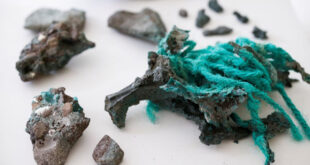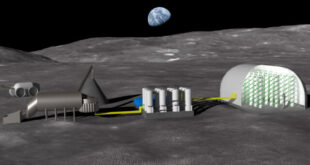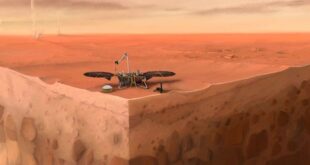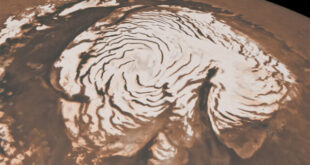In a paper published in the journal Nature, Dr. Barry Mauk of the Johns Hopkins University Applied Physics Laboratory and co-authors report observations of the so-called discrete electron acceleration over Jupiter’s auroral polar regions.
This image, created with data from Juno’s Ultraviolet Imaging Spectrograph, marks the path of Juno’s readings of Jupiter’s auroras, highlighting the electron measurements that show the discovery of discrete auroral acceleration processes indicated by the ‘inverted Vs’ in the lower panel. Image credit: NASA / JPL-Caltech / SwRI / Randy Gladstone.
Dr. Mauk and colleagues examined data collected by Juno’s Ultraviolet Imaging Spectrometer (UVS) and Jupiter Energetic Particle Detector Instrument (JEDI).
They observed signatures of powerful electric potentials — aligned with Jupiter’s magnetic field — that accelerate electrons toward the gas giant’s atmosphere at energies up to 400,000 electron volts.
This is 10 to 30 times higher than the largest auroral potentials observed at Earth, where only several thousands of volts are typically needed to generate the most intense auroras — known as discrete auroras — the dazzling, twisting, snake-like lights seen in northern and southern polar regions.
“We were not surprised that electric potentials play a role in their generation. What’s puzzling us is that despite the magnitudes of these potentials at Jupiter, they are observed only sometimes and are not the source of the most intense auroras, as they are at Earth,” Dr. Mauk said.
“At Jupiter, the brightest auroras are caused by some kind of turbulent acceleration process that we do not understand very well.”
“There are hints in our latest data indicating that as the power density of the auroral generation becomes stronger and stronger, the process becomes unstable and a new acceleration process takes over. But we’ll have to keep looking at the data.”
Scientists consider Jupiter to be a physics lab of sorts for worlds beyond the Solar System, saying the ability of the giant planet to accelerate charged particles to immense energies has implications for how more distant astrophysical systems accelerate particles.
But what they learn about the forces driving Jupiter’s auroras and shaping its space weather environment also has practical implications in our own planetary backyard.
“The highest energies that we are observing within Jupiter’s auroral regions are formidable,” Dr. Mauk said.
“These energetic particles that create the auroras are part of the story in understanding Jupiter’s radiation belts, which pose such a challenge to Juno and to upcoming spacecraft missions to Jupiter under development.”
“Engineering around the debilitating effects of radiation has always been a challenge to spacecraft engineers for missions at Earth and elsewhere in the Solar System,” he added.
“What we learn here, and from spacecraft like NASA’s Van Allen Probes and Magnetospheric Multiscale mission that are exploring Earth’s magnetosphere, will teach us a lot about space weather and protecting spacecraft and astronauts in harsh space environments.”
“Comparing the processes at Jupiter and Earth is incredibly valuable in testing our ideas of how planetary physics works.”
_____
B.H. Mauk et al. 2017. Discrete and broadband electron acceleration in Jupiter’s powerful aurora. Nature 549: 66-69; doi: 10.1038/nature23648
 #Bizwhiznetwork.com Innovation ΛI |Technology News
#Bizwhiznetwork.com Innovation ΛI |Technology News




